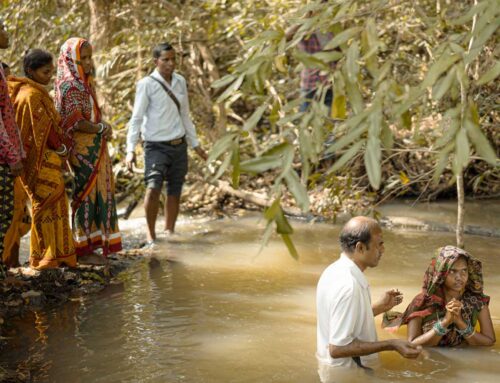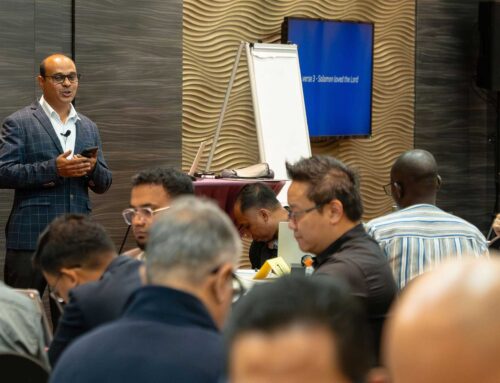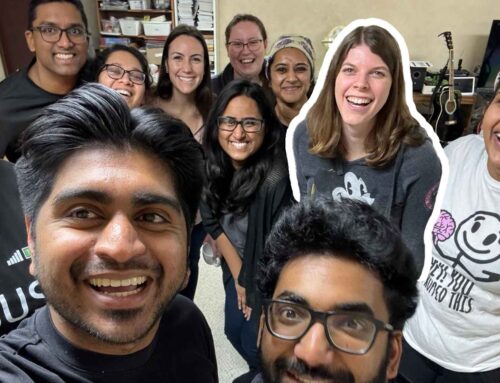The Good News Travels through the Conflict
Smoke rises over Lebanon as the cross-border conflict between Hezbollah militants and Israel continues. Sirens sound as airstrikes reduce buildings to rubble and force even more people from their homes. It is estimated that 1.2 million people are displaced in this eastern Mediterranean country where Haggai leader Joseph* lives and works.
Known for its varied religious composition, Lebanon has served as a refuge for persecuted Christian and Muslim groups since the 7th century. However, with the economic and financial crisis that has impoverished most of the population since 2019, human rights conditions are deteriorating, and tensions are increasing.
Yet, even in this volatile and often hostile environment, Joseph chooses to share the hope that guides him in every aspect of his life, from his family, surrounded by those with a different faith around him, or in his role in government. He attributes this to his Haggai Leader Experience in 2010 when he says, “The Lord spoke to me, and I truly decided to serve Him and carry out the Great Commission. He placed telling the Good News on my shoulders, so I started talking to those in the majority religion I know around me and inviting them to church.”
Joseph began doing outreach visits that resulted in more than 90 families hearing the Gospel in their homes, especially as many weren’t allowed to attend a Christian church. As a result of these efforts years ago, he says, “Today we have in the church 15 families from the majority religion who take the risk to attend weekly.”
Persecution by family members and governmental prohibitions against speaking about religious matters are the main hurdles to sharing the Gospel in Lebanon. For this reason, when Joseph hears the story of a non-Christian friend who has placed the Bible next to another book of faith in the living room for all to see, he knows God is moving in their midst.
He says, “The Lord opens doors for me to share the Gospel and the Good News is being delivered — whether directly or indirectly. Despite the prohibitions against speaking about religious matters during work, the Lord is good and capable. Even by telling a story, mentioning a verse, explaining fasting in the Bible, or praying with colleagues, I can bring Jesus into the conversation.”
As Joseph watches his countrymen wrestle with fear and despair even as the headlines zero in on war around them, he goes about distributing Bibles and telling people it is the Word of God placed in our hands so that we know who God is and what His will is for our lives. He regularly tells the story of God’s love and His plan for salvation through Christ, knowing that hope can only be found in Jesus.
*Name changed for security reasons.
Written by Carolyn Grant
The Good News Travels through the Conflict
Smoke rises over Lebanon as the cross-border conflict between Hezbollah militants and Israel continues. Sirens sound as airstrikes reduce buildings to rubble and force even more people from their homes. It is estimated that 1.2 million people are displaced in this eastern Mediterranean country where Haggai leader Joseph* lives and works.
Known for its varied religious composition, Lebanon has served as a refuge for persecuted Christian and Muslim groups since the 7th century. However, with the economic and financial crisis that has impoverished most of the population since 2019, human rights conditions are deteriorating, and tensions are increasing.
Yet, even in this volatile and often hostile environment, Joseph chooses to share the hope that guides him in every aspect of his life, from his family, surrounded by those with a different faith around him, or in his role in government. He attributes this to his Haggai Leader Experience in 2010 when he says, “The Lord spoke to me, and I truly decided to serve Him and carry out the Great Commission. He placed telling the Good News on my shoulders, so I started talking to those in the majority religion I know around me and inviting them to church.”
Joseph began doing outreach visits that resulted in more than 90 families hearing the Gospel in their homes, especially as many weren’t allowed to attend a Christian church. As a result of these efforts years ago, he says, “Today we have in the church 15 families from the majority religion who take the risk to attend weekly.”
Persecution by family members and governmental prohibitions against speaking about religious matters are the main hurdles to sharing the Gospel in Lebanon. For this reason, when Joseph hears the story of a non-Christian friend who has placed the Bible next to another book of faith in the living room for all to see, he knows God is moving in their midst.
He says, “The Lord opens doors for me to share the Gospel and the Good News is being delivered — whether directly or indirectly. Despite the prohibitions against speaking about religious matters during work, the Lord is good and capable. Even by telling a story, mentioning a verse, explaining fasting in the Bible, or praying with colleagues, I can bring Jesus into the conversation.”
As Joseph watches his countrymen wrestle with fear and despair even as the headlines zero in on war around them, he goes about distributing Bibles and telling people it is the Word of God placed in our hands so that we know who God is and what His will is for our lives. He regularly tells the story of God’s love and His plan for salvation through Christ, knowing that hope can only be found in Jesus.
*Name changed for security reasons.
Written by Carolyn Grant
The Good News Travels through the Conflict
Smoke rises over Lebanon as the cross-border conflict between Hezbollah militants and Israel continues. Sirens sound as airstrikes reduce buildings to rubble and force even more people from their homes. It is estimated that 1.2 million people are displaced in this eastern Mediterranean country where Haggai leader Joseph* lives and works.
Known for its varied religious composition, Lebanon has served as a refuge for persecuted Christian and Muslim groups since the 7th century. However, with the economic and financial crisis that has impoverished most of the population since 2019, human rights conditions are deteriorating, and tensions are increasing.
Yet, even in this volatile and often hostile environment, Joseph chooses to share the hope that guides him in every aspect of his life, from his family, surrounded by those with a different faith around him, or in his role in government. He attributes this to his Haggai Leader Experience in 2010 when he says, “The Lord spoke to me, and I truly decided to serve Him and carry out the Great Commission. He placed telling the Good News on my shoulders, so I started talking to those in the majority religion I know around me and inviting them to church.”
Joseph began doing outreach visits that resulted in more than 90 families hearing the Gospel in their homes, especially as many weren’t allowed to attend a Christian church. As a result of these efforts years ago, he says, “Today we have in the church 15 families from the majority religion who take the risk to attend weekly.”
Persecution by family members and governmental prohibitions against speaking about religious matters are the main hurdles to sharing the Gospel in Lebanon. For this reason, when Joseph hears the story of a non-Christian friend who has placed the Bible next to another book of faith in the living room for all to see, he knows God is moving in their midst.
He says, “The Lord opens doors for me to share the Gospel and the Good News is being delivered — whether directly or indirectly. Despite the prohibitions against speaking about religious matters during work, the Lord is good and capable. Even by telling a story, mentioning a verse, explaining fasting in the Bible, or praying with colleagues, I can bring Jesus into the conversation.”
As Joseph watches his countrymen wrestle with fear and despair even as the headlines zero in on war around them, he goes about distributing Bibles and telling people it is the Word of God placed in our hands so that we know who God is and what His will is for our lives. He regularly tells the story of God’s love and His plan for salvation through Christ, knowing that hope can only be found in Jesus.
*Name changed for security reasons.
Written by Carolyn Grant















